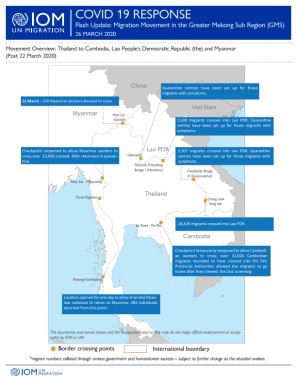-
Countries
-
Data and Analysis
-
Special Focus
-
Crisis Responses
COVID 19 Response - Greater Mekong Subregion (26 March 2020)
As the number of COVID-19 cases increases across a growing number of countries in the Asia Pacific, IOM is concerned about the impacts on migrants, refugees, IDPs, returnees and other vulnerable groups. Migrants may be disproportionally vulnerable to COVID-19 transmission due to their living and working conditions and barriers and exclusion from health systems, public education and outreach. The mobility restrictions applied by various governments since the outbreak of the pandemic have had a complex and multifaceted impact on the global mobility context.
The announcement of wide-ranging business closures by the governor of Bangkok on Saturday, 21 March 2020 triggered a mass movement of migrants from Bangkok, Thailand to their home provinces within Thailand, as well as across borders to home countries: Cambodia, Lao People’s Democratic Republic (the) and Myanmar. There continues to be an increase in returns seen, and it is expected that after the Government of Thailand’s announcement of emergency decree measures additional migrants will return in the coming days. This could lead to the seeding of new clusters in areas of return, transmission among returnees during crowded buses and border crossings, as well as those held in collective settings for quarantine. The majority of home communities are rural areas in Cambodia, Lao People’s Democratic Republic (the) and Myanmar, which are unprepared for monitoring, testing or treating any COVID-19 cases that may arise. Unlike the patterns from other countries with the majority of cases starting in urban areas, in these three countries of return rural areas may drive transmission. While official border crossings have increasingly closed, this has not slowed returns. There has instead been a subsequent increase in crossings at unofficial border points. There are also concerns regarding the economic impacts for migrants who have had to leave their employment or have lost their jobs. IOM is present in all four countries to monitor and support as much as possible with available resources and staffing.

